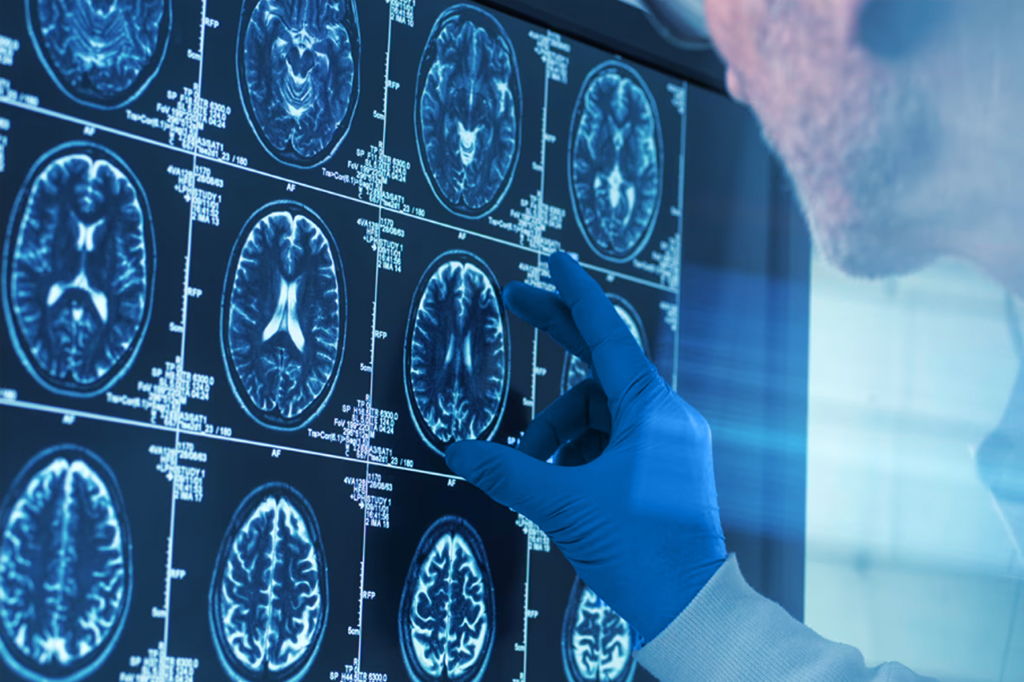Neurocysticercosis, or cerebral cysticercosis, is a parasitic infection of the central nervous system caused by the larvae of the tapeworm Taenia solium, also known as the pork tapeworm.
Cerebral Cysticercosis
Neurocysticercosis occurs when parasite eggs, ingested through water or food contaminated with human feces, develop into larvae that invade body tissues, including muscles, eyes, and the brain.
Neurocysticercosis is one of the leading causes of acquired epilepsy, particularly in developing countries, where it represents a major public health concern due to poor sanitation infrastructure.
The life cycle of Taenia solium begins when a person consumes raw or undercooked pork containing larval cysts, known as cysticerci. These develop into adult tapeworms in the small intestine, releasing eggs through the host’s feces, which another person can then ingest through contaminated water. The larvae emerge and travel via the bloodstream to different organs.
Neurocysticercosis Symptoms
Symptoms vary widely depending on the location, size, number, and developmental stage of the cysts in the brain. However, the most common symptoms include:
- Seizures: The most frequent symptom, which can be either focal or generalized seizures. These often serve as the first sign of the disease—even in individuals with no history of epilepsy.
- Headaches: Recurring headaches may be related to increased intracranial pressure, swelling, or hydrocephalus (the buildup of fluid in the brain).
- Intracranial hypertension syndrome: May present with vomiting, vision loss, drowsiness, and, in severe cases, altered consciousness.
- Focal neurological deficits: These can include weakness or loss of sensation in a part of the body, depending on the cyst’s location in the brain.
- Cognitive deficits: Some patients may experience memory deterioration, confusion, or difficulty concentrating.
- Obstructive hydrocephalus: A serious condition where cysts block the normal flow of cerebrospinal fluid, potentially becoming life-threatening if not treated.
- Psychiatric symptoms: Anxiety, depression, or psychosis can develop depending on the location and impact of the parasite in the brain.
Neurocysticercosis Treatment
The treatment of neurocysticercosis is multidisciplinary and depends on factors such as the status of the cysts, the number of lesions, the severity of the symptoms, and the patient’s individual response.
Among the main therapeutic approaches is the use of antiparasitic drugs aimed at eliminating the larvae and destroying the cysts, although their administration can cause temporary inflammation in the brain, which requires additional management with corticosteroids.
In addition, the use of antiepileptic drugs may be required in those patients who have developed seizures.
In cases of intracranial hypertension, the placement of a ventriculoperitoneal shunt may be required to drain excess cerebrospinal fluid from the brain through a thin tube.
Some cases may require surgery to remove the cysts if they are causing severe symptoms and are also accessible.
Additionally, comprehensive support is important and includes neurological rehabilitation, psychological support, and constant patient monitoring to prevent relapses.
The ideal goal is to reduce the incidence of neurocysticercosis or cysticercosis in general, and this is best achieved by improving sanitation through the consumption of safe drinking water, access to adequate sanitation facilities, and education on hygienic habits such as handwashing.
It is also important to cook food properly, especially pork; this action helps eliminate the cysticerci.
Although neurocysticercosis is a preventable disease, it still represents a significant burden in many parts of the world, especially in regions with limited healthcare conditions.
Early diagnosis and appropriate treatment can significantly improve patients’ quality of life.
At the ABC Medical Center’s Neurological Center, we can provide you with specialized care. Contact us!



